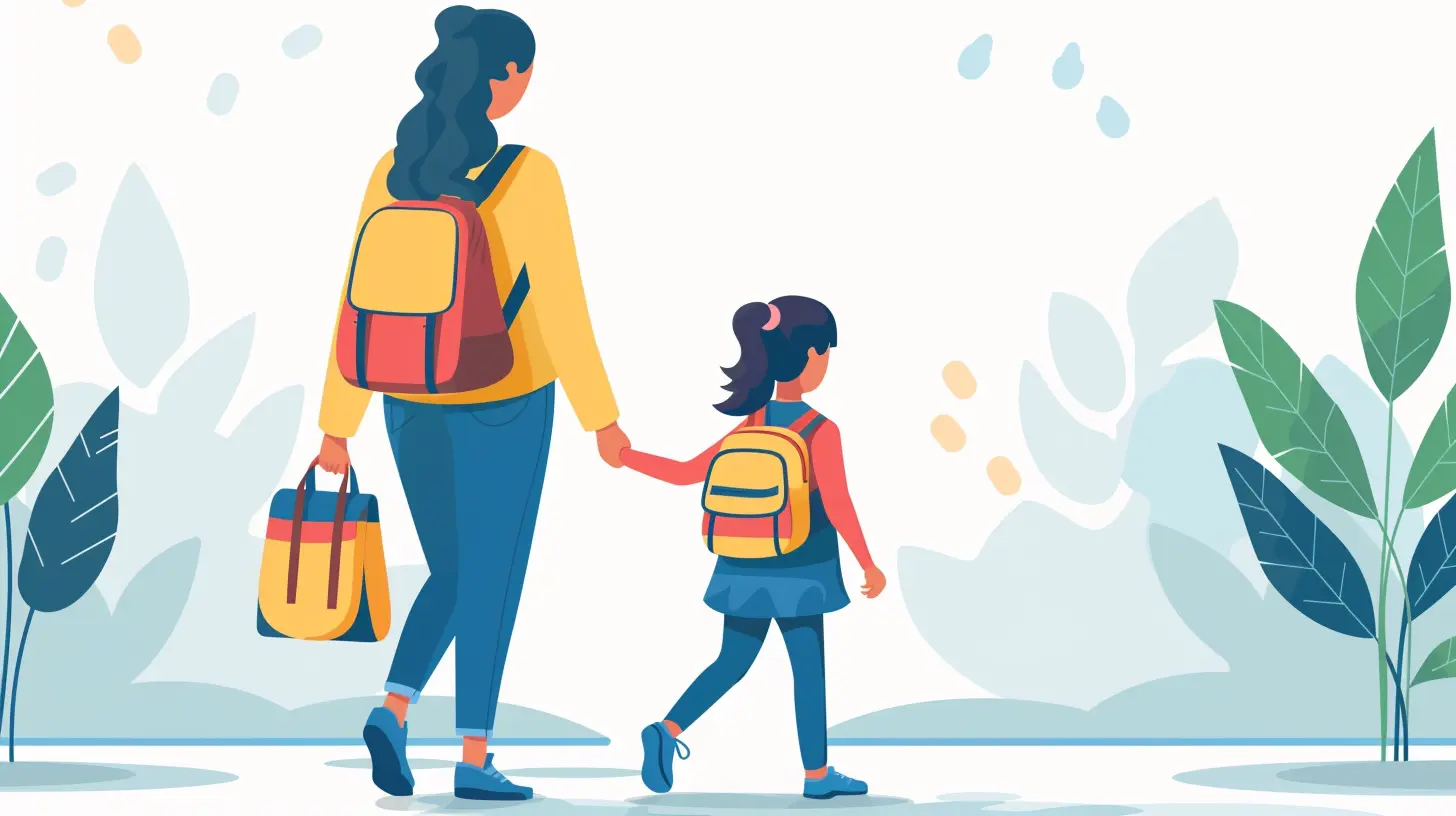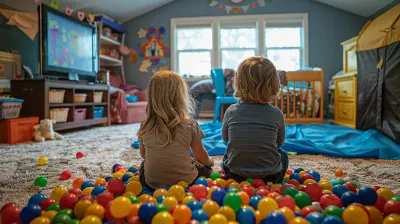How to Handle Separation Anxiety When Dropping Your Child Off at School
19 June 2025
Let’s be real for a second: dropping your child off at school for the first time (or the twentieth time) can feel like someone’s taking a tiny piece of your heart and wrenching it away with little, chubby hands that say, “Don’t go, Mommy!” or “Daddy, stay just ONE more minute!” And if you're the parent who walks away with teary eyes and a heavy heart... yeah, welcome to the club — separation anxiety doesn’t discriminate.
But here's the thing: it gets better. For both of you. And while that first drop-off might feel like a tragic movie scene on loop, with tears, guilt, and clinging arms, there are ways to make it manageable, even empowering. So buckle in, because we’re diving deep into the psychology, the chaos, and the quirky coping tricks to help you and your mini-me handle separation anxiety when school drop-offs feel like emotional warfare.
What Exactly Is Separation Anxiety?
Okay, let’s break it down. Separation anxiety is like your brain’s overprotective roommate — it freaks out every time you try to leave your favorite person. For kids, school represents a big, unfamiliar jungle. You're their safe zone, their home base, their MVP. Leaving that safe space? Terrifying.For parents, it’s a weird blend of pride, sadness, and guilt. You WANT them to grow up and be independent — but also? Stop growing up so fast!
Now before we all start sobbing into our coffee, let’s look at why this happens.
Why School Drop-Offs Set Off The Alarm Bells
Kids thrive on routine and familiarity. So, when you’re suddenly dropping them into a classroom filled with new sounds, smells, rules, snack times (is it just me, or do school snacks sound fancier than ours?), it’s no wonder they panic.Here are some of the usual suspects that trigger school-related separation anxiety:
- Change in routine (new school, new teacher, different drop-off person)
- Big life changes (recent move, divorce, new sibling)
- Fear of the unknown (Will anyone play with me? What if I miss mom?)
- Your own anxiety (yep, kids feel it like Wi-Fi signals)
Spoiler alert: Even the most confident of kids can have a moment. Or ten.
The Parent-Kid Separation Anxiety Spiral (And How to Break It)
You know the one. Your child clings, cries, you feel awful, you stay longer, they cling harder, and boom — cycle locked.Here’s the big truth bomb: prolonging the goodbye only makes things worse.
Instead, do this:
1. Create a Solid Morning Routine
Kids love predictability. If your mornings feel like a tornado of mismatched socks, burnt toast, and missing backpacks, your child absorbs that chaos. Create a calm, steady rhythm.- Wake up at the same time
- Do breakfast together
- Talk about the day ahead
- Keep things light and distraction-free (No news on TV!)
Think of it like choreographing a dance — you’re setting the tone for a smooth performance.
2. Establish a Goodbye Ritual (AKA The Magic Spell)
Give them something to look forward to every time you part ways. A secret handshake, a nose kiss, a whispered “You’ve got this,” or even a superhero pose at the door — your call.Rituals create comfort. Kids start to associate that gesture with strength, security, and confidence. It’s like their emotional armor.
3. Keep Goodbyes Short, Sweet & Solid
No lingering. No “Okay, just ONE more hug.” That’s like pulling off a Band-Aid reeeeeally slowly — it hurts more.Say goodbye confidently (even if you’re dying inside), smile, give the hug, and walk away. Trust me, nine times out of ten, the tears stop when you’re out of sight.
What NOT to Do (Unless You Enjoy Melodrama)
- Sneak out without saying goodbye – Tempting, right? But it breaks trust. Your child will start to worry that you might vanish anytime, anywhere.- Make promises you can't keep – “I’ll be back in 10 minutes!” (Nope, school goes till 3.)
- Show your own anxiety – They pick up on body language like mini emotional detectives. Fake the confidence if you have to.
- Punish them for crying – Emotions aren’t bad. Imagine someone yelling at you for missing your partner on a work trip? Ouch.
Helping Your Child Build Confidence (Even If They’re a Soft Cinnamon Roll)
Separation anxiety isn’t just about leaving — it’s about whether they feel capable of handling what comes next.Here’s how to help them grow those emotional muscles:
1. Talk About School Positively
Mention the fun stuff: “Do you think they’ll have dinosaurs in the sandbox again?” creates curiosity instead of fear.Make school seem like a wondrous land of finger paints and best-friend-making opportunities.
2. Read Books About Separation
Books are magical mirrors. Some great reads include:- The Kissing Hand by Audrey Penn
- Llama Llama Misses Mama by Anna Dewdney
- Owl Babies by Martin Waddell
Read them together. Let them ask questions. Let them cry. That’s healing.
3. Practice “Mini Separations” at Home
Start small. Leave them with Grandma for an hour. Or let them play in another room while you “go shopping” in your closet. Build their trust that you always come back.What If the Anxiety Doesn’t Go Away?
Ah yes, the tough cases. Sometimes, despite our best efforts, the tears still roll. That doesn’t mean you’ve failed. It just means your little one needs more time.Here’s when to dig in a little deeper:
- Their anxiety lasts longer than four weeks
- It’s interfering with friendships or learning
- They show physical symptoms (like stomachaches) daily
- They come home saying “nobody likes me” often
In cases like these, consider checking in with a child psychologist or school counselor. Sometimes, a professional ear helps uncover fears they just can’t put into words.
Real Talk: What About Parents’ Separation Anxiety?
Yep, you’re not off the hook.We’re talking about:
- Crying in the car after drop-off
- Checking the school webcam 17 times a day
- Planning elaborate lunches as a form of guilt-based love
Been there.
Your feelings are valid, but here’s the pep talk: Your child isn’t just surviving without you at school — they’re learning, laughing, becoming their own little human.
You’re not abandoning them.
You’re giving them wings, one brave goodbye at a time.
Quirky Hacks That Surprisingly Work
Let’s lighten it up. Here are some oddball tips that parents swear by:- Give them a “hug button” – Draw a heart on their hand. Tell them if they press it, they’ll feel your hug.
- Send a silly lunchbox note – Something like, “Knock knock… Who’s there?... Lettuce!... Lettuce who?... Lettuce be friends, okay?” Child giggles guaranteed.
- Photo tokens – Let them carry a keychain with your family photo.
- Make mornings musical – Dance to a feel-good song while getting ready. Confidence boost city.
Final Thoughts: You’ve Totally Got This
Separation anxiety might feel like an emotional tug of war right now, but trust me, it’s temporary. Your child WILL find their groove. And you? You’ll go from weeping in the car to confidently sipping a latte in your quiet house thinking, “Man, it’s too quiet…”And yes, one day, you’ll miss those clingy, wet-cheeked goodbyes. But until then, embrace each drop-off as a learning moment — for both of you.
Remember: It’s not about never feeling fear; it’s about teaching your child (and yourself) that you’re brave enough to face it.
all images in this post were generated using AI tools
Category:
Dealing With AnxietyAuthor:

Austin Wilcox
Discussion
rate this article
2 comments
Uriah McClain
Separation anxiety? More like separation opportunity! Time for you to shine while they conquer the schoolyard!
June 23, 2025 at 3:37 AM

Austin Wilcox
Thank you for your positive perspective! Embracing separation as an opportunity can definitely help both parents and children thrive during this transition.
Azura Anderson
Navigating separation anxiety requires patience and understanding. Establish consistent routines, offer reassurance, and celebrate small victories. Remember, your child's emotions are valid; your calm presence can provide the confidence they need to embrace new experiences and grow independently.
June 19, 2025 at 2:28 AM

Austin Wilcox
Thank you for your insightful comment! Patience, consistent routines, and reassurance are indeed essential in helping children manage separation anxiety effectively. Celebrating their progress can make a significant difference!


